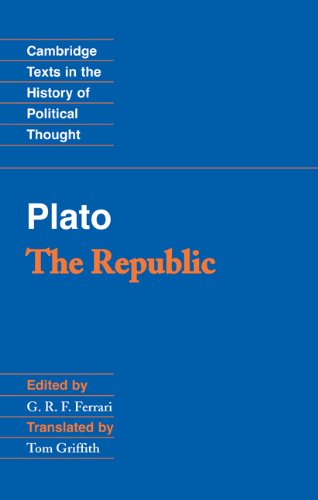Plato: The Republic (Cambridge Texts in the History of Political Thought) ebook download
Par cruse claire le mercredi, août 17 2016, 06:26 - Lien permanent
Plato: The Republic (Cambridge Texts in the History of Political Thought) by Plato, G. R. F. Ferrari, Tom Griffith


Plato: The Republic (Cambridge Texts in the History of Political Thought) Plato, G. R. F. Ferrari, Tom Griffith ebook
ISBN: 052148443X, 9780521484435
Page: 436
Publisher:
Format: pdf
Without further ado, I want to straightforwardly put forth the core argument of this essay as follows: in The Prince Machiavelli implicitly present himself as a potential Prince, as the philosophy-king in Plato's Republic who is simultaneously able and willing to rule. Download Plato: Gorgias, Menexenus, Protagoras (Cambridge Texts in the History of Political Thought) Plato , 427?-347 BC, Greek philosopher. One might have thought that these confessions would disqualify them from writing about Plato since it is clear that for him they were central to an understanding, central to philosophy. In other words, Machiavelli tells the reader that he can obtain the knowledge of political matters via Machiavelli's thoughts on historical affairs. Starting from scratch, Socrates in Book II of Plato's The Republic attempts to visualise an ideal city in order to explore further the notion of political justice and where it fits within the boundaries of that city. $10.97 Plato: The Symposium (Cambridge Texts in the History. The Philosopher as king in Plato's Republic The introduction of the idea of philosopher rulers is the greatest of all the revolutionary moments Plato has prepared for readers of the Republic[5], wrote University of Cambridge Professor Malcolm Schofield. This is a completely new translation of one of the great works of Western political thought. [3] Cicero, On the Commonwealth and On the Laws. An Historical Account of the Argument of the Two Treatises of Government' (Cambridge: Cambridge University Press, 1995). "Plato: The Republic (Cambridge Texts in the History of Political Thought)" Overview. They are paid by the institution, they are promoted (or not) by it, they acquire fame through it, and, if they are institutionally successful, they create through their students academic empires, political entities which support and promote, for the most part, their own orthodoxy. Plato: 'The Republic' (Cambridge Texts in the History of Political Thought). In general I've been enjoying the slight liberties Tom Griffith takes in his translation of Plato's Republic (Cambridge Texts in the History of Political Thought), since they make the dialogue more natural and idiomatic.